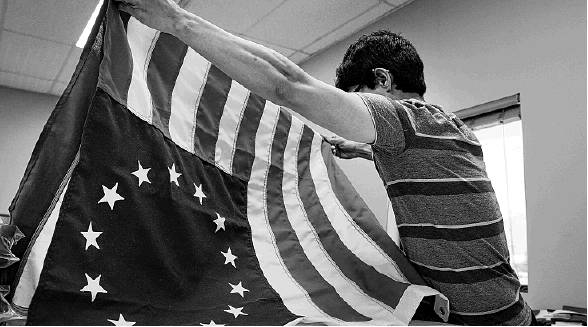EDITORIAL
Flag meant to unify
Hate groups might fly it, but it’s not theirs.
A T-shirt that Marvel movies star Chris Pratt wore recently is becoming a hot item on Etsy and other online shopping sites — no doubt due to the publicity it received after several websites reported that Pratt was seen sporting a shirt emblazoned with a design associated with white supremacists.
No, it wasn’t a swastika. It was the American flag, accompanied by a coiled rattlesnake and the words “Don’t Tread On Me.”
The websites offered no evidence that the logo has become synonymous with racist groups. The image first appeared on the so-called Gadsden flag — whose roots can be traced to the American Revolution — and did become popular among tea-party groups about 10 years ago.
Forged Apparel, which makes the T-shirt Pratt wore, explained in a statement that its founders included former Navy SEALs. “As we fought for our country, many of us wore the 1st Navy Jack flag on the sleeves of our uniforms, which the Gadsden military-authorized flag is based on.”
Pratt’s T-shirt probably wouldn’t have been given a second thought had he not worn it so soon after a separate controversy involving an iconic American symbol appropriated by racists, the 13-star U.S. flag purportedly designed by Betsy Ross for the colonial army during the Revolutionary War.
Nike recalled thousands of Independence Day-themed sneakers after former NFL quarterback Colin Kaepernick criticized the company for decorating the heel of each shoe with a flag waved by hate groups at racist events.
Perhaps Nike felt it owed Kaepernick. Sales of its shoes went up after it began an ad campaign featuring the out-of-work football player, whom NFL owners seemed to blackball for kneeling during games to protest racism.
Nike could have made a much stronger statement by refusing to let racists hijack a symbol traditionally linked to our common cause as Americans —our flag.
It’s not just patriotic symbols that have fallen into racists’ hands. A version of the logo for the Detroit Red Wings hockey team was displayed by hate groups at the Unite the Right rally where counter-protester Heather Heyer was killed two years ago. Even the OK hand signal has been appropriated by racists. Where does it stop?
Four years ago, a student government subgroup at the University of California Irvine voted to ban the display of flags in a lounge area, including the American flag because it promotes nationalism, which they said “contributes to racism and xenophobia.” A number of professors signed a letter supporting the students’ decision, but it was vetoed by the student government association’s executive cabinet.
That was the right thing to do. Rather than succumb to the thievery of patriotic icons by racists, we must cling even tighter to the emblems that belong to all of us. That is especially so when it comes to any version of the American flag.
Other emblems whose association with hatred is neither casual nor recent are lost. The swastika, which dates back thousands of years to ancient Eurasian cultures, will forever be associated with the war crimes of Nazi Germany. The Confederate flag, despite attempts to popularize it as a benign symbol of the South, was flown by an army that fought to preserve slavery and has long been the official banner of racists.
The American flag doesn’t belong in such despicable company. Racists may wave it, and that may offend us. But calling for wholesale boycotts or bans only allows haters to claim ownership of symbols that belong to all of us.
Hate groups may pretend that flying Old Glory makes them patriotic, but that’s a delusion the rest of us don’t have to accept. Instead, we should take every opportunity to properly display the flag as the symbol of unity that Abraham Lincoln sought to preserve.
